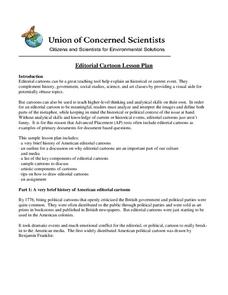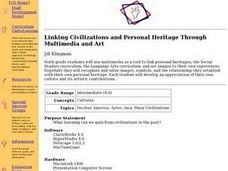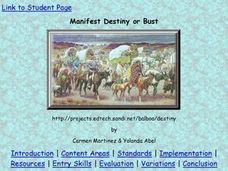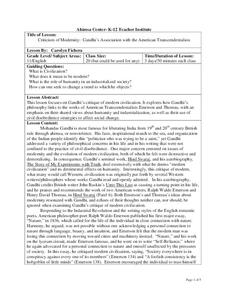Curated OER
Performance Evaluation
Students evaluate in class performance of music previously prepared by the ensemble. The rubric and assessment criteria are adaptable to any orchestra setting which allows the teacher to choose music to be assessed. Critical thinking...
Curated OER
Editorial Cartoon Lesson Plan
Students consider the role of editorial cartoons on American politics. In this editorial cartoons instructional activity, students discover the history of the cartoons in America, analyze some cartoons, and then draw their own cartoons...
Curated OER
To Kill a Mockingbird - Introductory Role Play and Historical Background
High schoolers participate in role-play activities to explain that emotional and social effects of prejudice discussed in the novel, To Kill a Mockingbird.
Curated OER
The Renaissance: How did it change the world?
Eighth graders identify the conditions in Medieval Europe that contributed to the beginning of the Renaissance. They find characteristics of the Renaissance in its art, economy, discoveries, and ideas. They examine the ideas of Humanism...
Curated OER
Exploring Photographs, Lesson 2—A Closer Look: Analysis in the Museum
Young scholars explore photographic works of art. In this visual arts instructional activity, students analyze selected photographs by Garcia, Ray, and Eggleston. Young scholars take their own photographs in the style of these...
Curated OER
Checking Facts with Snopes, Factcheck & Politifact
Students examine the art of fact-checking. In this current events lesson, students read the provided article "Snopes: The Internet Cesspool," "FactCheck: Proceed with Caution," and "Politifact: Separating Fact from Fiction." Students...
Curated OER
The House of Dies Drear
Learners read The House of Dies Drear and understand how he filled a need and helped people. In this philanthropy lesson plan students understand how the people who helped on the "Underground Railroad" filled a need and helped others....
Curated OER
Problem Solving and Decision Making
Help your teenagers learn to plan ahead before making a decision. With hypothetical examples and an online format, this could be a good addition to a language arts, teen issues, or health class. The format itself is not very...
Curated OER
Linking Civilizations and Personal Heritage Through Multimedia and Art
Students explore images, symbols, and the relationship they establish with their own personal heritage. They discuss Aztec, Inca, and Maya civilizations. Students interview their family about their own personal heritage. Additional cross...
Curated OER
Social Studies: Aztec Calendars and Culture
Sixth graders analyze the Aztec calendar and create their own examples of them. They determine the meaning of the symbols used in the calendars and record their ideas in journals. Students host a parent breakfast for them to observe...
Curated OER
Social Studies: Manifest Destiny or Bust
Fifth graders explore the westward movement between 1800 and 1861 in the United States. They write narratives from the standpoint of those cultures that were repressed during this period, such as Native Americans, slaves, or Mexicans. ...
Curated OER
Social Studies: Ancient Egypt
Seventh graders explore the history, geography, and culture of ancient Egypt. They research daily life and compare it with their present lives. Students, in pairs, trace their body outlines on poster paper and work individually to use...
Curated OER
Social Effects of WWII on SC (Pt. 3)
Fifth graders examine the impact of World War II on South Carolina. In this American history lesson, 5th graders analyze primary documents that include political cartoons and advertisements that were published in South Carolina during...
Curated OER
Criticism of Modernity: Gandhi's Association with the American Transcendentalists
Eleventh graders explore Gandhi's philosophy links to the works of American Transcendentalists Emerson and Thoreau. In this transcendentalism lesson, 11th graders discuss essential questions about civilization and modernity.
Curated OER
What Makes the Writer Write
High schoolers chose a novel which includes social criticism to read. After reading the book, they use the internet to research the issue in the novel and work with others to develop a presentation. In their presentation, they identify...
Curated OER
The Rest Cure: Gender in Medicine and Literature
Read and discuss "The Yellow Wall-Paper" and the gender issues that the story brings up. Use articles from the time period to analyze, complete with specific discussion questions. After two days, scholars write an essay based on topics...
Curated OER
Scouting Civil War Sites
Middle schoolers evaluate websites after gathering information from various search engines. In this Civil War instructional activity, students browse the web and find strategies for rating websites. Middle schoolers choose...
Curated OER
Stop Action and Assess Alternatives
Students stop action and determine how history may have been altered. In this historical perspectives lesson, students consider how the Cherokee Removal, the Transcontinental Railroad, the Immigration Act of 1924, and the dropping of the...
Curated OER
From Greece to Main Street
Students consider the influence of the Greeks on American architecture. In this American Greek Revival architecture lesson, students identify the attributes of architectural style as they compare the Parthenon with the Lincoln Memorial....
Curated OER
Rudyard Kipling's "Rikki-Tikki-Tavi": Mixing Fact and Fiction
"Rikki-Tikki-Tavi," from The Jungle Book, offers young readers a chance to examine how Rudyard Kipling uses setting and personification to bring to life the brave mongoose who battles cobras to protect his family. Class members...
Curated OER
The Red Studio Turns 100!
Young scholars observe the art of Henri Matisse and discuss the ideas and feelings his art brings about. In this Henri Matisse lesson plan, students look at many of his artistic paintings and discuss and write in a journal the point of...
Robert F. Kennedy Center for Justice and Human Rights
Vaclav Havel: Free Expression
Develop an understanding of universal human rights, particularly the freedom of expression, with the questions and activities that analyze the conflicts of Vaclav Havel. Learners define, interpret and rephrase the human rights article in...
Film Foundation
Mr. Smith Goes to Washington: What Is a Movie?
Watching is not the same as seeing. Transform viewers from passive watchers to active students of film with this 34-page packet, filled with lessons and activities that use Mr. Smith Goes to Washington to examine the technology, the...
Curated OER
Great Expectations: DRTA Strategy
A Directed Reading Thinking Activity (DRTA) strategy for Great Expectations scaffolds and guides readers as they begin Dicken's novel. Step-by-step directions are provided, as are chapter one pair-share questions, a prediction worksheet,...

























